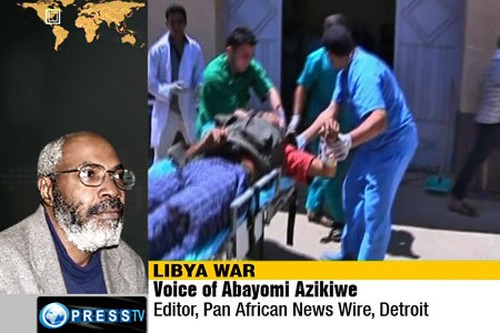
Abayomi Azikiwe, editor of the Pan-African News Wire, has been interviewed on numerous occasions on Press TV. Azikiwe has discussed U.S. foreign policy toward Libya and the African continent., a photo by Pan-African News Wire File Photos on Flickr.
'Somalia famine worsened by West'
Interview with Abayomi Azikiwe, editor of Pan-African News Wire
Fri Jul 15, 2011 9:39AM
http://www.presstv.ir/detail/189189.html
Climate change, exploitation of resources and America's covert operations in what one analyst describes as the Western occupation of Somalia are exacerbating the famine woes in the Horn of Africa nations.
Press TV talks with Abayomi Azikiwe, the editor of Pan-African News Wire in Detroit, who discusses the military aid agenda of the US in Somalia and how this is to the detriment of the people now experiencing the worst famine in more than a half a century. Following is a transcript of the interview.
Press TV: Can the effects of this drought be blamed only on nature or do leaders in countries like Somalia have some blame to shoulder as well?
Azikiwe: First of all, it's been reported that this is the worst drought in sixty years in the east and Horn of Africa region. But drought does not necessarily translate into famine.
Famine is a result of the inability of a country to feed its people adequately and it also results from the inability of the various state institutions to provide relief to those population groups that have been so terribly affected.
What is interesting about this situation that exists right now in East Africa and in the Horn of Africa states is that the US has very close relationships to all the governments that are now the most negatively affected by the drought.
For example, in Somalia the US is propping up the Transitional Federal Government (TFG) there; it is bankrolling not only the TFG, but it's also supporting and training the military forces of Burundi and Uganda who have at least 8,000 troops occupying the capital of Mogadishu in order to prevent the al-Shabab Islamic resistance movement from taking power in that country.
In neighboring Ethiopia, the government there is largely subsidized mostly by the US. The Meles Zenawi regime in the past has occupied territory in Somalia on behalf of the US. So it's quite ironic that the US is supplying a tremendous amount of military assistance; they even have a CIA station, that has been documented in the latest issue of The Nation magazine, in Somalia.
But at the same time they (US) cannot do hardly anything to provide food and water to people who are suffering in the millions in this particular region of Africa.
Press TV: Though Africa's resources are large it has been “raped” by the developed world. How much of an effect does that have influencing Africa on how it responds to things like drought and famine?
Azikiwe: It's interesting that the major corporate media outlets in the US never draw the link between climate change and drought. Many specialists on African affairs have sighted this phenomenon and have sighted that increased disasters in the region stemming from a lack of rainfall and also consequent crop failure--and this can be attributed to industrial policies of the so-called developed countries.
Nonetheless, the drought as I've said before doesn't necessarily translate into famine. Its result is strictly stemming from the inability of these countries to provided aid, water and food to their populations.
So yes, the fact that these countries produce mineral resources, agricultural commodities and the prices of these goods are set largely by the former colonial countries and the US. This has a lot to do with the fact that they're incapable at this point of providing food and water adequately to their populations.
No comments:
Post a Comment